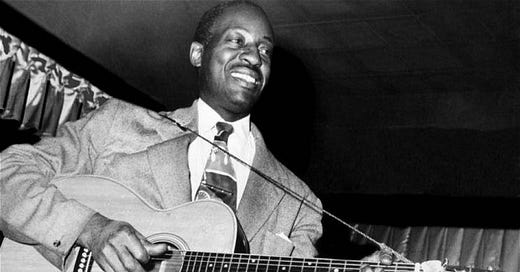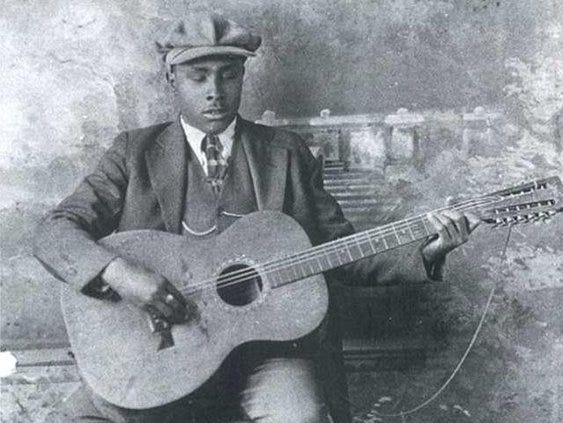To claim that music conveys meaning differently than language is not controversial. The sounds of instruments and the musicality of the human voice pulse with emotion, wit, humor. Language in music — the auditory poetry of lyricism — likewise functions differently than typical written or spoken words. Most lyrics fail as poetry on the page. “Here comes the sun do do do do / Here comes the sun / And I say it’s all right.” A fifth-grader could have penned those sentences, but set in sound, “Here Comes the Sun” becomes a restorative mantra, or at the very least catchy songwriting.
And yet, the unimaginative among us are quick to ridicule repetitive lyrics or lyrics that convey meaning in ways otherwise inaccessible to written and spoken language. I’m thinking of John Fahey’s claim that blues musicians just said any phrases that came to mind or the persistent disdain for ‘mumble rap’ espoused by ever-vocal ‘old heads.’ The blues and rap, as improvisational forms, respond to the needs of the present. Musical meaning cannot be reduced to OED definitions. Sometimes the way you say something says more than what you actually say.
I want to look at two instances of extreme repetition in the blues to better understand the way music produces meaning outside of language. After all, why should music pretend to be poetry?
Blind Willie McTell, “Broke Down Engine Blues”
A Piedmont style songster, McTell sings blues and ragtime in a clear and gentle tenor, smooth despite the crackles of his recordings. He has some famous champions: on “Blind Willie McTell,” Bob Dylan sings “I know no one can sing the blues like Blind Willie McTell.”
“Broke Down Engine” is a song of desperation. It’s also where Michael Hurley nabbed the title phrase for “Drivin’ Wheel,” one of my favorites from Have Moicy! McTell is down bad, broke and strung out. He pawns his pistol, pawns his suit. He crawls to his ex’s door, begs for a place to sleep, if not a second chance.
As he laments his sorry state, McTell turns to god. He’s ambivalent, one second falling to his knees in prayer, the next informing whoever’s listening that “he ain’t cryin’ for no religion,” he just wants his ex back. If god can get him to her door, he’ll never ask for anything again.
Which makes it all the more complicated when McTell’s speech dissolves into pure repetition, sighing, “Lordy lord, lordy lordy lordy. Lordy lord, lordy lordy lord.” This is the plea of a professed sinner, a rambler wary of god. But McTell’s at the end of his rope, so what the hell, prayer’s all he’s got.
Lordy lord. Lordy lordy lord.
By the next couplet, he’s knocking on his woman’s door. God came through. McTell starts fantasizing about his ex’s erotic prowess: “What makes me love my woman? She can really do the Georgia crawl. Lordy lord, lordy lordy lord.” The lord’s name in vain, the bit-lip sexual satisfaction of a man in heat. This is no prayer, it’s lust. Lord transformed, the same syllable with almost opposite meaning.
Big Bill Broonzy, “Hey, Hey Baby”
Like McTell, Big Bill is a first-class blues vocalist. His glossy delivery and locomotive fingerpicking helped bring country blues into an urban setting. Performing regularly at Chicago’s Gate of Horn (run by Al Grossman, later manager of Odetta and Dylan), Broonzy influenced musicians as disparate as Muddy Waters and Jerry Garcia.
“Hey, Hey Baby” is one of his more famous compositions, a mostly instrumental demonstration of his percussive guitar playing. The uptempo and up-beat plucking oozes puffed-chest cool. Big Bill is bragging, relishing in elastic bends and slides, furious 8th-note hammer-ons and pull-offs.
So when he pops in to say “hey hey, hey hey, baby hey,” he knows that his guitar is doing the real talking. He’s showing off; with skill like that, he attracts suitors with a simple “hey” and dismisses his “baby” with the same. Saying anything more would say too much. “I’m going away to stay,” he tells her, before whipping up another minute-long exhibition in blues guitar.
Hey hey, hey hey, baby hey.
I recommend this strange, impressionistic, noir live version. Broonzy woos the woman looking on without even opening his mouth. A swinging overhead light casts the room in oscillating shadow. It’s really weird.





